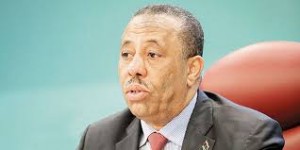By Libya Herald reporters.

Tripoli and Benghazi, 12 September 2016:
While the Thinni government in Tobruk today thanked members of the Petroleum Facilities Guard for not resisting Sunday’s army takeover of the eastern oil export terminals, the Presidency Council and the international community have condemned the seizures.
Army spokesman Colonel Ahmed Al-Mismari said this morning that the terminals at Sidra, Ras Lanuf, Brega and Zuetina were all under army control. However it is reported that at least one PFG member was killed in the operation. There were also unconfirmed reports of continuing resistance at Zuetina. It was not possible to contact the terminal. The army’s 153 Battalion entered Zuetina in the middle of last month but made no attempt to push into the terminal itself to the west of the town.
Mismari insisted that the oil terminals were now open to the National Oil Corporation to get on with exporting crude. The armed forces would not interfere.
Mismari did not mention that until Sunday’s dawn assault, three of the four terminals, the exception being Brega, had been under the control of PFG commander Ibrahim Jadhran. Visited in Ajdabiya by UNSMIL chief Martin Kobler in July, Jadhran then cut a deal with the Presidency Council to end his blockade of the terminals and allow NOC to resume exports.
Jadhran’s house was attacked on early Sunday, it seems as part of a brief fight during which the army claimed to have seized four tanks and 15 “technicals”. It is not known where Jadhran is now. There are unconfirmed reports that elders of the Magharba tribe, to which he belongs, have urged him to hand himself in to the army.
The army claimed that no damage had been done to any of the equipment in the export terminals. It said that smoke seen rising from the Sidra terminal came from a burning generator fuel tank.
Throughout Sunday, there was no public reaction from the Presidency Council. It was only in the early hours of this morning that it put out a statement protesting that the occupation of the four terminals was a blow to the process of reconciliation. It had frustrated the hopes of stability and ending bloodshed and suffering. The PC said it would respond wisely and with concern for the lives of ordinary citizens and the unity of the nation.
It insisted that it and Government of National Accord had the sole right to protect oil installations. It also suggested that foreign troops had been involved in the operation. The PC said that all patriotic Libyans and tribal elders should work with it to reverse this serious development by peaceful means.
UNSMIL chief Martin Kobler echoed the PC saying that the oil terminal attacks threatened Libya’s stability and could lead to greater divisions. He called for an immediate end to hostilities and urged both sides to avoid damaging the oil facilities. “Natural resources belong to all Libyans” he said, “Preserving them is in the national interest”
Six members of the international community also weighed in today. A joint statement from France, Germany, Italy, Spain, the UK and the US callied for an immediate ceasefire and the avoidance of damage to oil infrastructure.
They said there was an obligation “to ensure oil revenues are used to provide essential services fro the Libyan people”, adding “Libyan forces should unite in fighting the so-called Islamic State and other UN-designated terrorist groups”.
Ibrahim Dabbashi, until his recent firing by the PC, Libyan’s UN ambassador, speculated that the terminals had been seized to act as a buffer zone between the east and west of the country, or to impose division or what he described as “a puppet government”.






